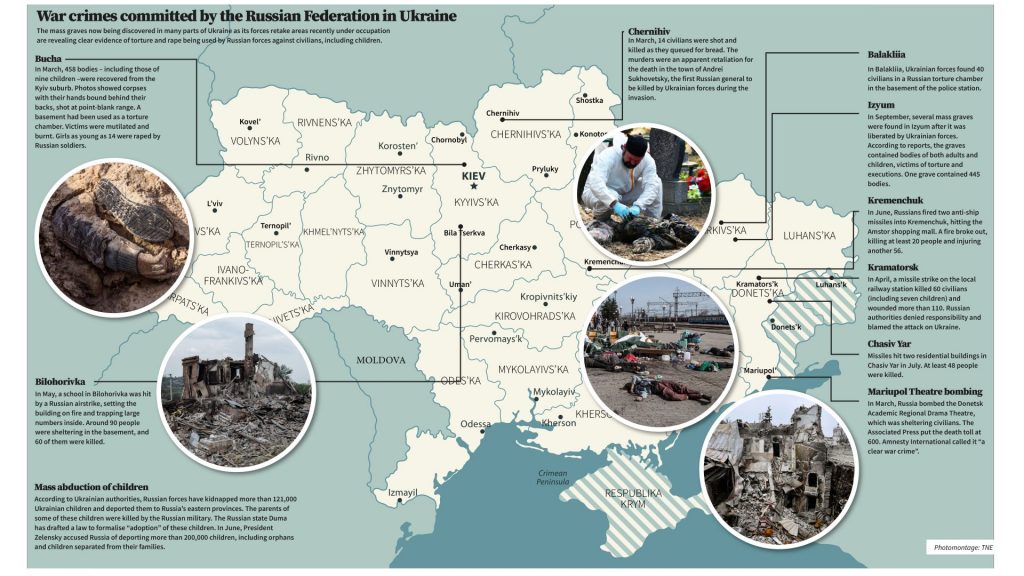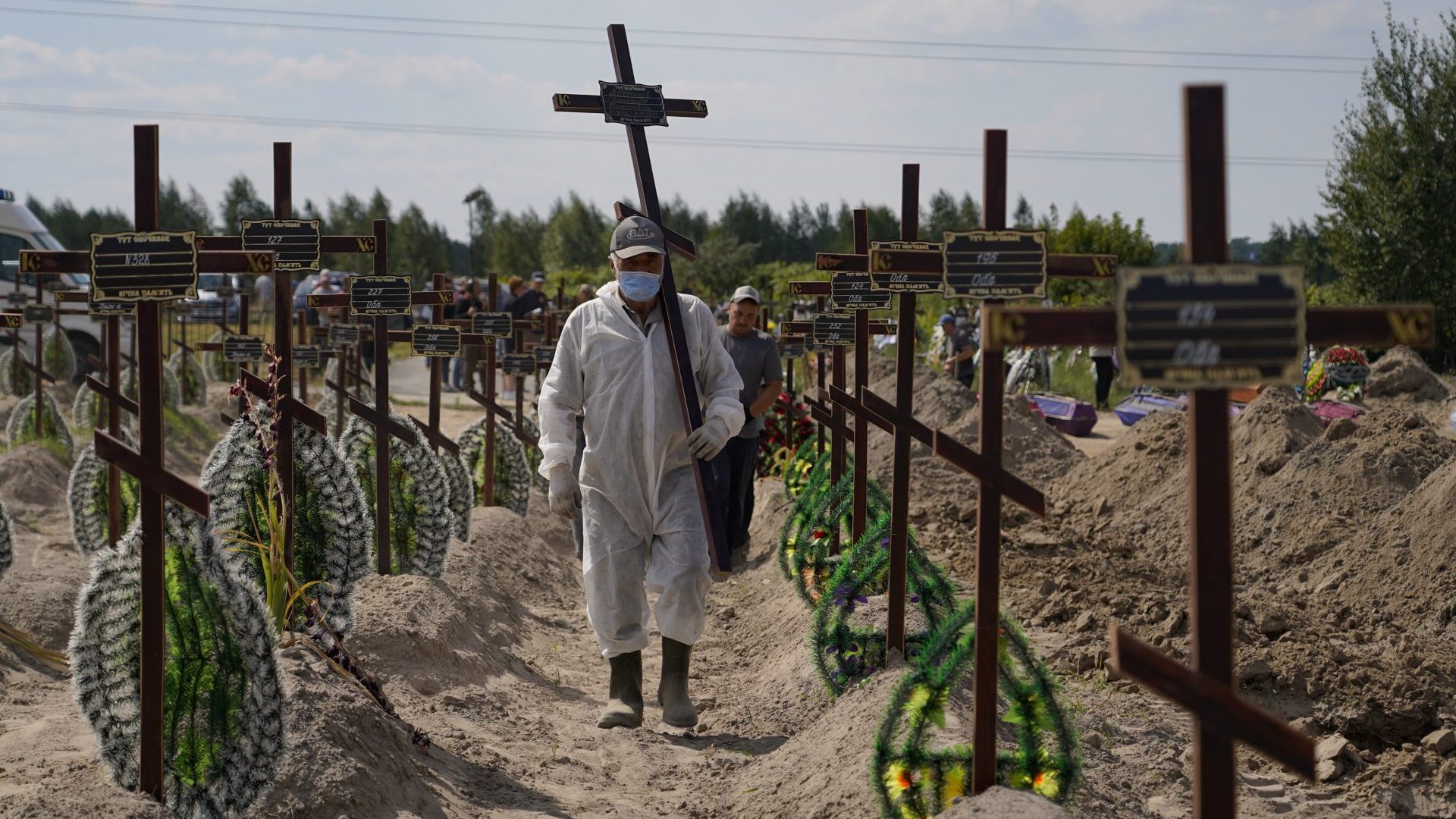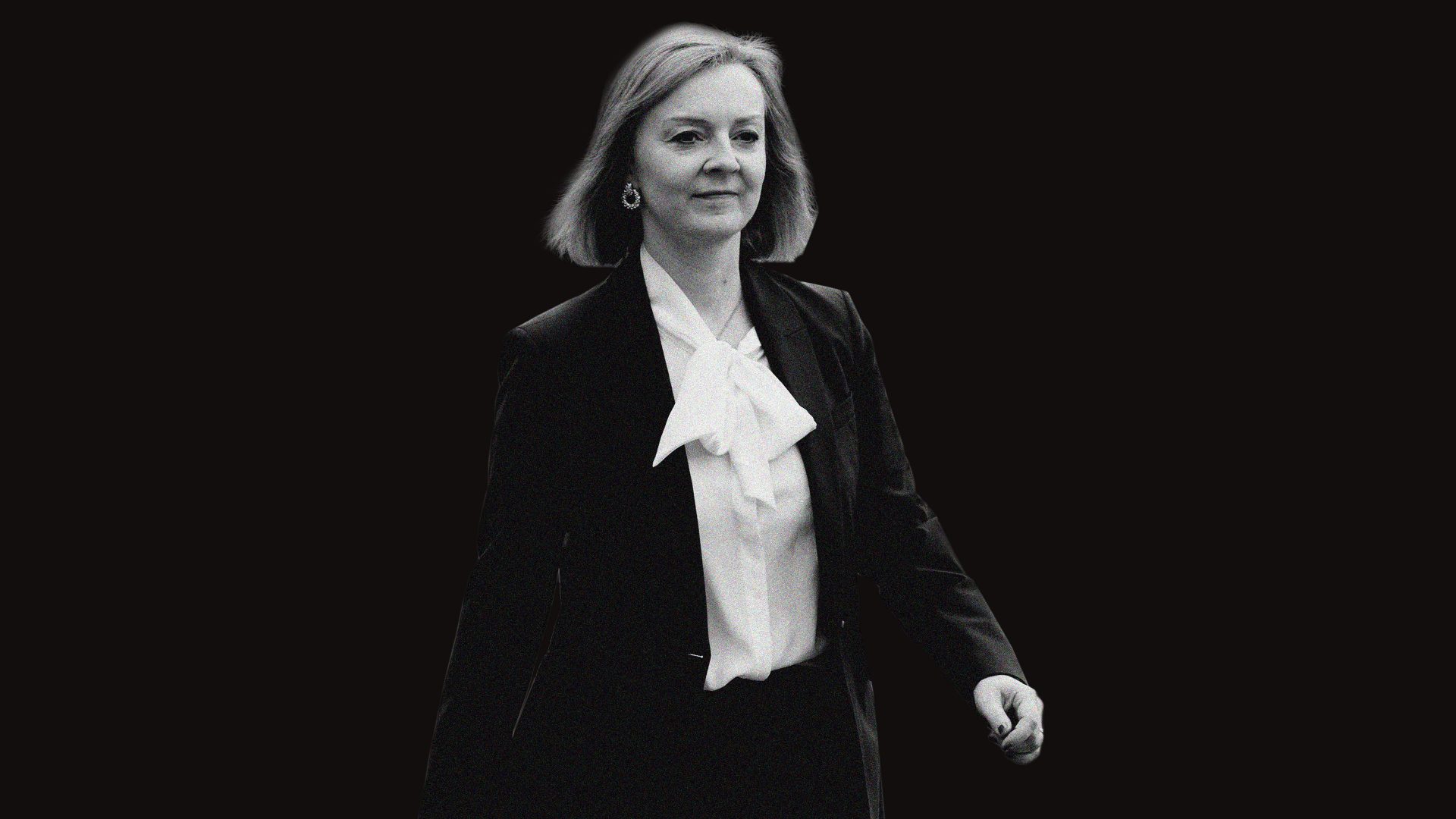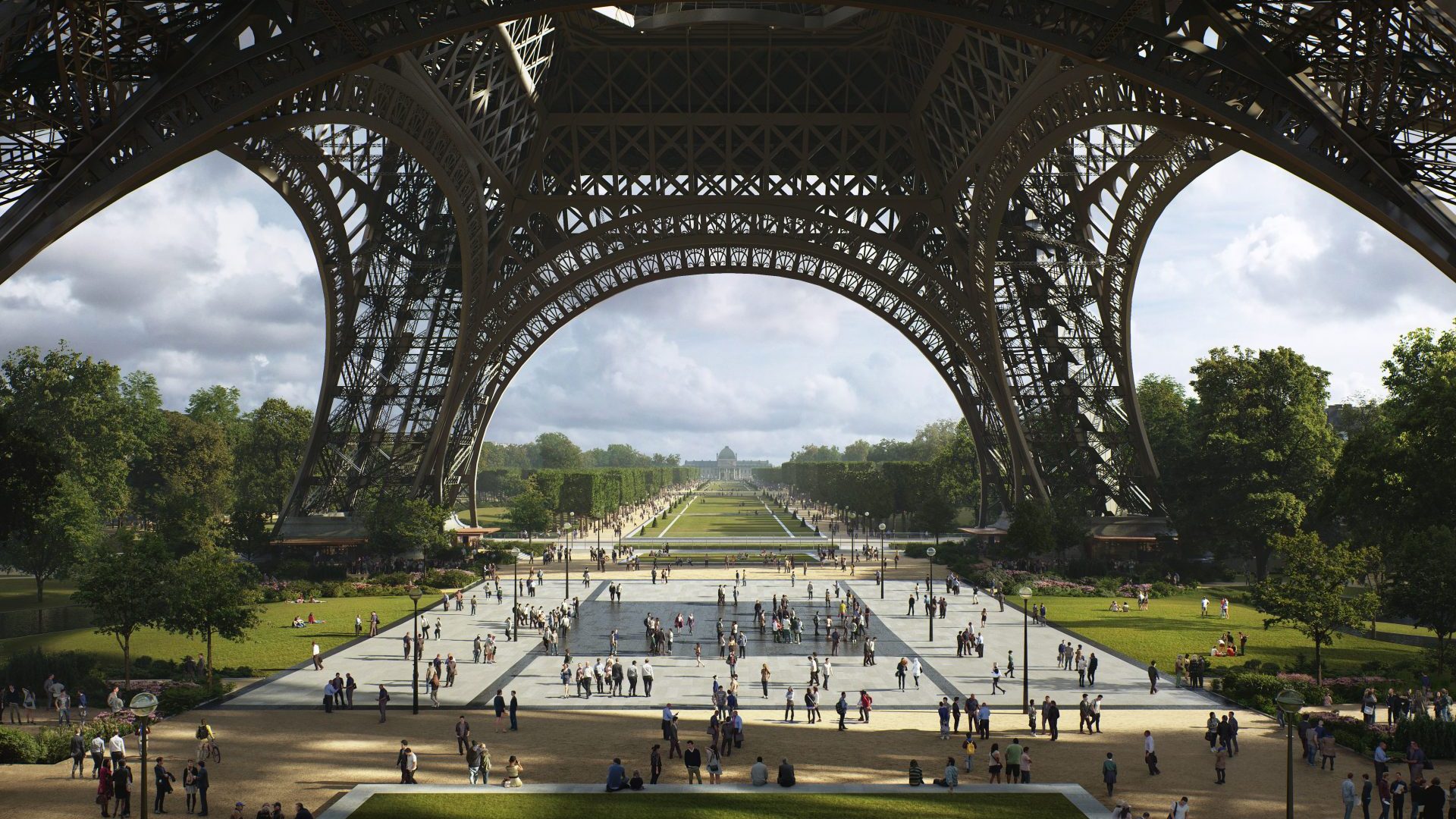On a drizzly Monday morning, I am standing behind the Church of Andrew the Apostle in Bucha. This churned up patch of grass was once the site of a mass grave. On March 10th, a week into the Russian occupation of this Kyiv suburb, local people began collecting bodies from the streets and wheeling them here in supermarket trolleys. The morgue had run out of space but the cemetery on the outskirts of town was too close to the frontline. Picking up the dead was risky because of the shooting. Some corpses were being eaten by dogs.
“Some were wrapped in black body bags, others in sheets or blankets”, says the local Orthodox priest Andriy Golovin. “Quite a few were missing arms, legs or genitals. Some bodies were half burned. The Russians wanted to hide what they’d done.”
Bucha is a prosperous commuter town just over 20 miles northwest of the capital. It has become synonymous with the worst of Russia’s war crimes although it was not a one off. As Ukrainian forces rapidly move eastwards, liberating territory they are making more grisly discoveries. In the recently liberated city of Izyum, there is a sickening sense of déjà vu as bodies are exhumed from another mass grave under the pine trees. Officials there say at least 1,000 civilians were killed; some by shelling and airstrikes while others appear to have been summarily executed.
The full horror of such crimes has yet to be uncovered, but it is increasingly clear that systematic torture, rape and executions in cold blood are not the result of certain soldiers or commanders going rogue but part of Russia’s modus operandi. A journalist who recently escaped from the southern city of Kherson says the atrocities there are worse than those in Bucha because victims have been imprisoned for months and have been slowly tortured to death. In a heart-breaking speech, a volunteer medic kept in captivity for three months in the besieged port city of Mariupol has described how she witnessed several agonising deaths including that of a seven-year boy. Detained in the same basement, the child died in her lap for want of medicine.
But Bucha was the first place where such atrocities were discovered and so it holds a special place in history. As I drive through the streets, there is a sense of eerie calm. People are trying to put back a semblance of normality into their everyday lives, by repairing damaged roofs or working in their vegetable plots. An old woman in a headscarf bends over slowly as she collects the windfall from her apple tree.
At the Divine Pizza restaurant, Ukrainian rock music mingles with sounds from the kitchen and children’s laughter. There are few signs of the 33-day Russian occupation here apart from a couple of cracked TV screens. The waiter tells us that back in March “some unwanted ‘guests’ came in, got plastered and started chucking stuff all over the place.”
In a booth by the window, Nastya is celebrating her 10th birthday with her mother Taisiya and a couple of school friends. Taisiya says she also had some unwelcome guests. Her family lives a short drive outside the town, in a house in the forest. Russian snipers took over their second floor. “It was terrifying, but they were more civilised than the other soldiers”, she says. “They even tried to apologise when they left.”
Taisiya tells me that she is a computer games designer, and she wants her children to speak fluent English. The little girls ask me if I have ever met the Queen and offer their condolences.
As I think about all the stories of Russian troops raping women and underage girls in Bucha, I am struck by this family’s composure. I try to imagine what it would be like if enemy forces took over an equivalent town in the UK, somewhere like Beaconsfield.
Seven months on, Father Andriy has replaced most of the shattered glass in his church. But he conducts liturgies in the lower church at basement level now. In the upper church, icons have given way to an exhibition of gruesome photographs.
The priest has a long mournful face, like a saint in an icon, and sad hazel eyes. He has spoken to dozens of reporters, politicians and foreign dignitaries, police officers and forensics teams over the past months. Nevertheless, he painstakingly shows me each photograph and recounts the story behind it. “The Russians told civilians they’d be safe if they wore white armbands, but look at this,” he says gesturing towards a picture of a body face down on a muddy pavement. The dead man has a strip of white cloth tied around his elbow and he is clutching a packet of spaghetti. He was a pensioner who had left his house to collect some humanitarian food aid.
“Russian propaganda said the massacre here was faked,” Father Andriy adds. “They claimed the corpses of civilians lying on the road with their hands tied behind their backs were showroom dummies or film extras and that the whole thing had been staged by MI6. But we were here – we know what happened. People heard terrible screams during torture sessions.”
Once the invasion force pulled out, the area around the mass grave had to be de-mined and then the exhumations began. There is a photograph of the priest standing under a canopy in the pouring rain with European Commission President Ursula von der Leyen, as bodies are pulled out of the ground to be identified. He says the town is very grateful to a team of French gendarmes and forensic experts with mobile DNA laboratories who helped people to find their dead relatives. Some bodies were so badly decomposed it was impossible to identify them. “The smell was so strong it made you gag,” he recalls.
Altogether 116 people, including 30 women and two children, were buried in the mass grave behind his church – just over a quarter of the 419 civilians killed in Bucha this spring. The dead included a singer in the church choir, his family and eleven of his neighbours. Some enemy troops were buried as well. “The Russians couldn’t be bothered to take their dead – they just left them behind,” says Father Andriy.
Many Bucha residents have returned home after taking refuge in western Ukraine and further afield in Europe. But around half of the population here is still missing. Most multi-storey blocks remain battle scarred and empty. The Giraffe shopping mall has been reduced to a pile of mangled metal, broken glass and rubble. Bridges blown up to slow the Russian advance have yet to be fixed. In the centre of Kyiv you would hardly know the country is at war were it not for the number of men and women in army uniforms, the odd air raid siren and iron anti-tank defences which locals call hedgehogs. Bars and cafes are full, although customers are chucked out well before the 11pm curfew.
This is my second visit in a week to Bucha. The first time I joined an official delegation of the Yalta European Strategy group, which is funded by the billionaire Ukrainian businessman Viktor Pinchuk. This year many people assumed the annual jamboree would be an online only affair, as it had been during the pandemic. But two hundred days into Russia’s all-out war, an assortment of diplomats, politicians and experts from twenty countries have just arrived in Kyiv on an overnight train from Poland. They are herded onto coaches and driven to Bucha following a police car with flashing blue lights.
The first stop is the nearby Hostomel airfield, recaptured from the Russians at the end of March, where we are invited to inspect the ruins of the world’s largest aircraft, an 85 metre-long cargo plane called Mryia, meaning “dream” in Ukrainian. The nose has been ripped off, the fuselage is exposed, and a broken wing droops on the airport apron. Destroyed by Russia’s Airborne Forces on the second day of the war, the wreckage was supposed to provide the perfect backdrop to a victorious Russian parade a few weeks later. The men who attacked the base were lining up to be decorated for “heroic behaviour” by General Magomed Tushayev, a key commander of Putin’s most steadfast ally, the Chechen president, Ramzan Kadyrov.
But says our guide, Lieutenant Colonel Vitaliy Rudenko, “things didn’t quite go to plan”. With a thin smile, the Ukrainian officer describes how more than 100 Chechen fighters, including the general, were liquidated in one fell swoop. “We’d done some reconnaissance with military drones and knew they were preparing for the parade,” he says. “So, we wiped them all out.”
Lt Col Rudenko is on an undisguised PR offensive. “When we finally got the HIMARS from the US we clapped with joy,” he says. The High Mobility Artillery Rocket System which can fire six guided missiles in quick succession has been used to devastating effect against Russian command posts, ammunition depots and other targets. Before the travel weary foreigners finish their coffee and get back on their coach, the officer is determined to get his message across: with the right weapons and enough ammunition, Ukraine can win this war.
On social media, Ukraine has been winning the battle for hearts and minds hands down. Take for example the Telegram channel called “Find Your Loved Ones”. It posts details of Russian servicemen who have been killed or captured and encourages worried relatives to get in touch. Ukrainian presidential adviser Oleksiy Arestovych called it “a gesture of good will to Russian mothers.” But it is not just about claiming the moral high ground – it is also part of Ukraine’s information war. Early on it gave the lie to the idea that this invasion was, in the Kremlin’s words, just a “special military operation”.
The 17th meeting of the Yalta European Srategy group is also very much part of this sophisticated PR campaign. It hopes that the high-profile foreign opinion formers invited will return home and put pressure on their own governments to support Ukraine. On the marble stairs down to the conference centre in the basement of a heavily guarded Kyiv hotel, I bump into the French philosopher Bernard Henri Levy, the former Prime Minister of Sweden Carl Bildt and the Turkish entrepreneur Haluk Bayraktar whose drones have played a starring role in destroying Russian artillery and armoured vehicles.
Even before the news of Ukraine’s advances, the mood is bullish. President Zelensky’s opening speech sets the tone. After Bucha there can be no negotiations with the enemy. “If somebody breaks into your house, loots it and kills your family, you will do whatever it takes to defeat them,” he says. “We Ukrainians are not crabs – we cannot go backwards or sideways. We can only go forwards.”
Olena Zelenska echoes her husband. In an emotional but polished speech she describes the psychological trauma of Ukraine’s children in the war. “We thought that such experiments of hate belonged to the 20th century,” she says. “But when you see what happened in Bucha, it is clear that the darkness has not gone away. Our focus now is to protect our people.”
There are louder calls for weapon deliveries, once the extent of the lightning-fast counter-offensive around Kharkiv becomes apparent. To widespread astonishment, after months of stalemate in the east, Ukrainian troops have forced back the Russians and retaken the strategic hub of Izyum along with 3,000 square kilometres of territory.
Victoria Nuland of the US State department, who joins the conference online, suggests that any war ends up in diplomatic negotiations but stresses it is up to the Ukrainians to decide when to come to the table. Asked whether Ukraine could contemplate giving up Crimea to end the war, defence minister Oleksiy Reznikov is scathing. The Russians have “passed the point of no return,” he says.

He has been to Belarus three times and Turkey once for negotiations. But Russian brutality towards civilians has changed the picture. Only a complete restoration of Ukraine’s territorial integrity and sovereignty within the internationally recognised borders as of 1991, would be acceptable.
“There is no way on god’s green earth Vladimir Putin will sign up to that,” interjects the host chairing the discussion. Reznikov retorts that Putin might not be the one to sign the act of surrender. “His successor might want to pull Russia out of the abyss into which they are falling with the speed of a shot down aircraft,” he says.
It feels as if the chances of Russia losing this war have gone from the impossible to something almost approaching plausibility. Until this week, Putin insisted his plans had not changed, he was “not in a rush” and he seemed reluctant to order a draft. Now, in a significant escalation, he has declared the partial mobilisation of 300,000 reservists. Meanwhile, Yevgeny Prigozhin, who runs the notorious Wagner mercenary group, has been secretly filmed recruiting convicts as cannon fodder. He told inmates at a prison in Mordovia that if they agreed to fight in Ukraine they would be freed after six months but if they deserted, they would be shot. It smacks of desperation but at least 11,000 men have already been signed up from prison colonies, according to Russian human rights activists, Olga Romanova.
Inside Russia, there has been a growing chorus of criticism. Military bloggers have exposed the incompetence and low morale of the troops. The Chechen leader Ramzan Kadyrov, always fulsome in his praise for the Russian President, has spoken about “mistakes” by the army and complained that the general staff doesn’t grasp “the real situation” on the ground. The normally compliant Communist party leader Gennady Zyuganov has said it is time to drop the pretence; Russia is fighting a war and urgently needs mass mobilisation.
State-controlled Russia media are not sure how to react. There has been no mention on television of a petition signed by more than 40 local elected officials across Russia demanding Putin’s resignation. But pro-Kremlin hawks want heads to roll. In discussion shows, others have floated the idea of suing for peace.
Russia has responded vindictively to Ukraine’s gains on the battlefield, attacking civilian infrastructure. There have been blackouts in Kharkiv and floods in Zelensky’s hometown of Kriviy Rih. After the abrupt shutdown of the Nord Stream 1 pipeline in early September, it is clear that Russia will continue to use gas as a weapon to divide Europe and erode support for Ukraine. There is the nightmare scenario of a bomb strike on Europe’s biggest nuclear power plant at Zaporizhzhia in central Ukraine. More chillingly, in his recent TV address to the nation, Putin threatened the west with nuclear retaliation. He said “we will use all the means at our disposal,” to counter Western encroachment on Russian territory, before adding that he was “not bluffing.”
Zelensky repeatedly emphasises that the next 90 days before winter sets in are crucial. There is much talk at the conference about Ukraine fatigue and how to counter it.
“I know there are some confused people in Europe whose moral compass is not functioning properly,” says the Latvian President, Egils Levits. “But there can be no question of capitulation.” However high the energy bills, he says Europeans must be ready to take a hit to preserve democracy in Ukraine and across the continent.
“Turn down the heating by three degrees in your homes this winter,” urges Zelensky’s adviser Mikhailo Podolyak, “and just remember that thanks to this war many Ukrainians don’t have homes at all.”
As speaker after speaker cries “Slava Ukraina!” (Glory to Ukraine) to loud cheers and applause, I am struck by the almost total lack of Russian anti-war opposition figures at the conference. Mikhail Zygar, the founding editor-in-chief of the independent TV news channel, Dozhd, makes a brief appearance on zoom. Now based in Germany he is described as a writer and columnist for Der Spiegel. He believes Putin no longer cares about impressing the West. The Kremlin’s new information battlefield is the global south. It will take decades, he says, before Russians can jettison their imperialist mindset and re-evaluate their history.
Svyatoslav Vakarchuk, a theoretical physicist, former MP and Ukraine’s best loved rockstar talks about dodging artillery while singing for frontline troops. He says that he is not boasting about his bravery but believes music is a potent “spiritual weapon”.
Vakarchuk’s band Okean Elzy has millions of fans in Russia and they have often performed there. He is asked why he thinks ordinary Russians have allowed this war to happen. He is as terse as the men in khaki: “I’m not interested in exploring the dark corners of the Russian soul,” he says. “Maybe at some point there’ll be studies of the behaviour of Russians like the one by Hannah Arendt on the banality of evil during Germany’s Third Reich. But right now we don’t need to analyse the Russians’ psychology. We just need to analyse their military, economic and political capabilities and crush them.”
As a lifelong Russophile, I am disconcerted by the speed with which Russians have become international pariahs. I lived in Moscow during the early 90s when I witnessed the breakup of the Soviet Union and its aftermath. Since then I have made frequent visits to make documentaries for the BBC, travelling across the Russian Federation from the gas fields of the Arctic to the vast forests near the Chinese border. Now the unprecedented crackdown on free speech has driven many of my Russian friends abroad.
On my last day in Kyiv, I visit the Pechersk Lavra high above the Dnipro River. Clutching a beeswax candle, I stumble through the dark underground caves lined with mummified monks who have lain there for centuries. To many this monastery is the holiest ground in the country, founded not long after the Prince of Kyiv, Volodymr the Great, converted his people to Christianity. Together with the Cathedral of St Sophia, it is the cradle of Ukrainian identity and also the place where the Russians believe their state began. However long this war drags on, there is no better place than this to reflect on the dark future that awaits Russia.
Around half a million Russians are believed to have left their country since the war began. The exodus not only includes artists, journalists, musicians and those openly opposed to Putin’s regime but also tens of thousands in the IT sector and other professions. The brain drain is accelerating as increasing numbers reject the war and the worsening business conditions caused by economic isolation. The most talented and open-minded Russians are fleeing their country. They leave behind them a country that is sinking into apathy and extreme nationalism.
Lucy Ash is a presenter of radio and TV documentaries




